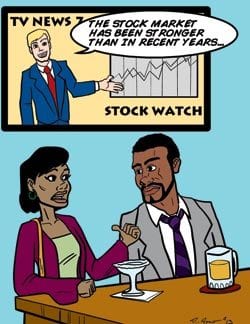
|
“We better refinance our mortgage before it’s too late.” |
Savings – A source of wealth
The American economy is still struggling to become robust after the most severe recession in history. According to the National Bureau of Economic Research, the Great Recession began in December 2007, hit bottom in June 2009 and completed its cycle in September 2010. However, for many African Americans, the recession continues.
There is an old adage that when the economy has sniffles, blacks come down with pneumonia. High unemployment was a major problem of the recession. In January, black unemployment was 14.3 percent compared with only 7.6 percent for whites.
Even more devastating than the loss of jobs was the loss of black household wealth during the recession. The net worth of black households in 2004 was $1 for every $11 of net worth for white households. In 2009, the net worth of white households had become almost 20 times higher — $92,000 to $4,900 for blacks.
Black wealth is now primarily a function of home ownership. When the real estate bubble burst, precipitating the Great Recession, the value of black homes across the country declined. With much of their wealth in investment securities, the net worth of white households was better able to retain their value.
Affluent individuals with cash have the flexibility to invest in a number of promising projects to build their wealth, but the first challenge is to acquire the cash. The current 3.0 percent drop in mortgage rates enables the urban homeowner to begin that process by refinancing. For example, a reduction of 3.0 percent on a 30-year mortgage for $200,000 will save about $356 per month.
Black and Latino homeowners are not taking advantage of this opportunity as aggressively as they should. Understandably, there is some apprehension about mortgage lenders after their friends and relatives were induced to sign up for subprime loans. Often the sad consequence of such a decision was default and loss of their homes.
OneUnited Bank, the nation’s largest black-owned bank with offices in Boston, Miami and Los Angeles, refused to make unqualified mortgages even as the real estate market heated up. As a result, there have been few foreclosures. The bank’s mission statement requires OneUnited to offer only “affordable financial services.” A high-risk mortgage that could lead to financial disaster does not meet that criterion.
Those determined to take control of their financial futures might be discouraged by the magnitude of the loss in value of their homes. For some, the outstanding balance of the mortgage might even exceed the appraised value of the property. In the past, that would have been an absolute deal killer, but now there is a program to save the day.
There is a special federal program called “HARP” (Home Affordable Refinance Program) administered by the Federal Home Finance Agency, that will provide relief for qualified homeowners. OneUnited Bank has access to the program, and so should you.
African Americans have succeeded in the battle for civil rights, and their turnout at the polls has demonstrated considerable political strength. Now they face the greatest challenge of all — to develop economic power. When you think about it, the major purpose of the other conflicts was to prevent blacks from acquiring real wealth.
Every homeowner owes it to his or her family to refinance and use the savings to invest for the future.
EDITOR’S NOTE: Bay State Banner Publisher and Editor Melvin B. Miller is a director of OneUnited Bank.






